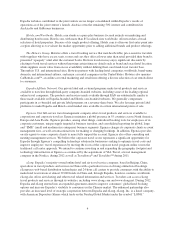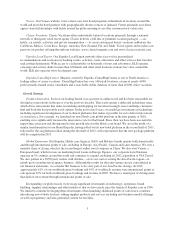Expedia 2012 Annual Report Download - page 20
Download and view the complete annual report
Please find page 20 of the 2012 Expedia annual report below. You can navigate through the pages in the report by either clicking on the pages listed below, or by using the keyword search tool below to find specific information within the annual report.even if we are successful in our branding efforts, such efforts may not be cost-effective, or as efficient as they
have been historically. Moreover, successful branding efforts with respect to some brands within the Expedia
portfolio have in the past and may in the future result in marketing inefficiencies and negatively impact growth
rates of other brands within our portfolio. If we are unable to maintain or enhance consumer awareness of our
brands and generate demand in a cost-effective manner, it would have a material adverse effect on our business
and financial performance.
We rely on information technology to operate our businesses and maintain our competitiveness, and
any failure to adapt to technological developments or industry trends could harm our business.
We depend on the use of sophisticated information technologies and systems, including technology and
systems used for website and mobile applications, reservations, customer service, communications, procurement,
payments, fraud detection and administration. As our operations grow in size, scope and complexity, we must
continuously improve and upgrade our systems and infrastructure to offer an increasing number of travelers
enhanced products, services, features and functionality, while maintaining or improving the reliability and
integrity of our systems and infrastructure.
Our future success also depends on our ability to adapt our services and infrastructure to meet rapidly
evolving consumer trends and demands while continuing to improve the performance, features and reliability of
our service in response to competitive service and product offerings. The emergence of alternative platforms such
as smartphone and tablet computing devices and the emergence of niche competitors who may be able to
optimize products, services or strategies for such platforms have, and will continue to, require new and costly
investments in technology. We may not be successful, or less successful than our competitors, in developing
technology that operates effectively across multiple technologies and platforms, which would negatively impact
our business and financial performance. New developments in other areas, such as cloud computing and software
as service providers, could also make it easier for competition to enter our markets due to lower up-front
technology costs.
In addition, we may not be able to maintain our existing systems or replace or introduce new technologies
and systems as quickly as we would like or in a cost-effective manner. We have been engaged in a multi-year
effort, which we expect to continue for several more years, to migrate key portions of our consumer, affiliate, and
corporate travel sites and back office application functionality to new technology platforms to enable us to
improve conversion, introduce innovation more rapidly, achieve better search engine optimization and improve
our site merchandising and transaction processing capabilities, among other anticipated benefits. These
migrations have been in the past, and may continue to be in the future, more time consuming and expensive than
originally anticipated, and the resources devoted to those efforts have adversely affected, and may continue to
adversely affect, our ability to develop new site innovations. In addition, during the migration process the sites
may experience reduced functionality and decreases in conversion rates. Also, we may be unable to devote
financial resources to new technologies and systems in the future. Overall, these implementations and systems
enhancements may not achieve the desired results in a timely manner, to the extent anticipated, or at all. If any of
these events occur, our business and financial performance could suffer.
Our business could be negatively affected by changes in search engine algorithms and dynamics or
other traffic-generating arrangements.
We increasingly utilize internet search engines such as Google, principally through the purchase of travel-
related keywords, to generate traffic to our websites. Search engines, including Google, frequently update and
change the logic that determines the placement and display of results of a user’s search, such that the purchased
or algorithmic placement of links to our websites can be negatively affected. In addition, a significant amount of
traffic is directed to our websites through our participation in pay-per-click and display advertising campaigns on
search engines, including Google, travel metasearch engines, including Kayak, and internet media properties,
including TripAdvisor. Pricing and operating dynamics for these traffic sources can experience rapid change,
both technically and competitively. Moreover, a search or metasearch engine could, for competitive or other
14
























